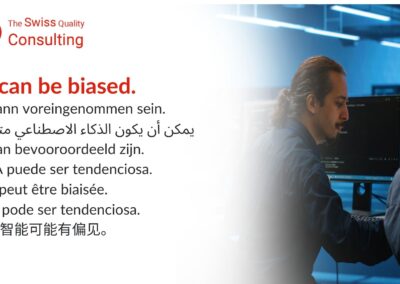Understanding and Mitigating AI Bias in Modern Technology
The Importance of Promoting Awareness of AI Bias and Fairness
In today’s rapidly evolving technological landscape, promoting awareness of AI bias and fairness is essential for organizations striving to harness the power of artificial intelligence (AI) ethically and effectively. AI has the potential to revolutionize various industries, from healthcare to finance, by providing advanced data analysis and decision-making capabilities. However, AI systems can also perpetuate and even exacerbate biases present in their training data, leading to unfair and discriminatory outcomes. Ensuring that employees and stakeholders understand AI bias and fairness is crucial for maintaining trust and achieving equitable AI implementations.
In regions like Saudi Arabia and the UAE, where AI is a key component of national development strategies, addressing AI bias and promoting fairness is of paramount importance. Saudi Arabia’s Vision 2030 and the UAE’s National AI Strategy 2031 both emphasize the integration of AI into various sectors to drive economic growth and innovation. To achieve these goals ethically, organizations in Riyadh, Dubai, and beyond must prioritize AI fairness and actively work to mitigate biases in their AI systems.
Raising awareness about AI bias involves educating employees and stakeholders about the sources and implications of bias in AI systems and providing practical strategies to address these issues. By fostering a culture of ethical AI practices, organizations can ensure that their AI implementations are fair, transparent, and trustworthy.
Implementing Comprehensive Employee Training Programs
One of the most effective ways to promote awareness of AI bias and fairness is through comprehensive employee training programs. These programs should educate employees about the importance of AI ethics and provide practical strategies for identifying and mitigating biases in AI systems. In regions like Saudi Arabia and the UAE, where AI adoption is accelerating, employee training is a critical component of ethical AI deployment.
Training programs should cover key topics such as understanding the sources of bias in AI, recognizing the impact of biased AI decisions, and implementing best practices for fairness in AI development. Employees should also be trained on how to use AI tools responsibly and how to identify potential biases in AI outputs. By equipping employees with the knowledge and skills to address AI bias, organizations can ensure that their AI systems produce fair and equitable outcomes.
In addition to initial training, organizations should provide ongoing education and updates on emerging trends and best practices in AI ethics. This can include regular AI ethics workshops, online courses, and informational newsletters. By maintaining a continuous focus on AI fairness, organizations can ensure that employees remain vigilant and informed.
Leveraging Executive Coaching for Ethical AI Leadership
Executive coaching can play a vital role in promoting awareness of AI bias and fairness at the leadership level. Business leaders in Riyadh and Dubai must be equipped with the knowledge and skills to drive ethical AI initiatives and foster a culture of fairness within their organizations. Executive coaching provides the necessary guidance and support to help leaders develop and implement effective AI ethics strategies.
Coaching programs can help executives understand the technical and ethical aspects of AI, as well as the potential benefits and risks associated with AI adoption. By staying informed about emerging trends and best practices in AI ethics, leaders can develop comprehensive AI strategies that prioritize fairness and transparency.
Furthermore, executive coaching can assist leaders in creating a culture of ethical AI practices within their organizations. This involves promoting AI fairness best practices among employees and encouraging proactive measures to identify and mitigate biases in AI systems. By fostering a culture of ethical AI, organizations can enhance their overall AI capabilities and build trust with their stakeholders.
Engaging Stakeholders in AI Ethics
Creating Awareness Campaigns for Stakeholders
Engaging stakeholders in AI ethics is essential for ensuring comprehensive and fair AI implementations. Organizations must communicate the importance of AI fairness to their stakeholders, including customers, partners, and suppliers. Awareness campaigns can be an effective way to educate stakeholders about the risks associated with AI bias and the measures they can take to promote fairness.
These campaigns should include clear and concise information about AI ethics, highlighting the potential consequences of biased AI decisions and the steps stakeholders can take to ensure fairness. This can include creating informative brochures, hosting webinars, and distributing educational materials through various channels. By raising awareness among stakeholders, organizations can foster a collaborative approach to AI ethics.
In regions like Saudi Arabia and the UAE, where AI is a significant part of business operations, engaging stakeholders in AI ethics initiatives is crucial. Organizations should work closely with their stakeholders to ensure that they understand the importance of AI fairness and are equipped with the tools and knowledge to promote ethical AI practices.
Utilizing Modern Technology for Fair AI Development
Modern technology offers several solutions that can enhance AI fairness and promote awareness. In regions like Riyadh and Dubai, where technological innovation is a priority, leveraging these technologies can help organizations stay ahead of emerging threats and maintain a secure digital environment.
One such technology is blockchain, which offers a transparent and tamper-proof way to manage data used in AI training. By using blockchain to store and track training data, organizations can ensure that the data is free from biases and can be audited for fairness. Blockchain can also provide a decentralized platform for verifying AI algorithms, ensuring that they operate transparently and ethically.
Artificial Intelligence (AI) and machine learning can also be used to monitor AI systems for biased behavior. These technologies can analyze patterns in AI decisions and identify potential biases, allowing organizations to take proactive measures to ensure fairness. By leveraging AI and machine learning, organizations can enhance their ability to detect and respond to AI bias.
Future Trends in AI Ethics and Fairness
As AI ethics and fairness continue to evolve, organizations must stay informed about emerging trends and technologies that can enhance their ethical AI strategies. In Saudi Arabia and the UAE, where AI adoption is rapidly advancing, adopting these trends will be essential for maintaining fair and transparent AI systems.
One emerging trend is the increasing use of explainable AI (XAI), which aims to make AI decisions more transparent and understandable. XAI techniques provide insights into how AI algorithms make decisions, allowing organizations to identify and address biases more effectively. By adopting XAI solutions, organizations can enhance the transparency and fairness of their AI systems.
Another trend is the development of AI ethics frameworks and guidelines by international organizations and industry consortia. These frameworks provide standardized approaches to AI ethics, ensuring that AI systems are developed and deployed responsibly. By adopting these frameworks, organizations in Riyadh and Dubai can enhance the fairness and transparency of their AI systems.
Conclusion: Ensuring Ethical and Fair AI Implementations
Promoting awareness of AI bias and fairness is essential for ensuring ethical and fair AI implementations in today’s digital age. By implementing comprehensive employee training programs, leveraging executive coaching, and engaging stakeholders in AI ethics initiatives, organizations in Saudi Arabia and the UAE can ensure that their AI systems are fair, transparent, and trustworthy.
Modern technology plays a vital role in enhancing AI fairness, offering innovative solutions such as blockchain and explainable AI. As AI ethics and fairness continue to evolve, staying informed about emerging trends and adopting proactive measures will be crucial for maintaining a secure and ethical digital environment. By prioritizing AI bias and fairness awareness, organizations can achieve long-term success and protect sensitive information in the digital age.
—
#AIBiasAwareness, #FairnessInAI, #EmployeeTrainingOnAI, #EthicalAIPractices, #AIInSaudiArabia, #AIInUAE, #RiyadhAIInitiatives, #DubaiAIEthics, #ExecutiveCoachingInAI, #ModernTechnology























